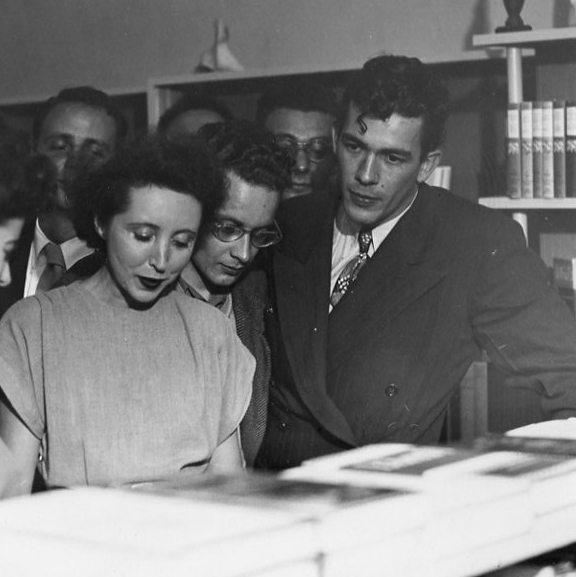What are we here for? What’s the purpose of our life?
Anaïs Nin had some opinions about that.
She believed “there is not one big cosmic meaning for all, there is only the meaning we each give to our life, an individual meaning, an individual plot, like an individual novel, a book for each person.”
Anaïs, essayist and memoirist, believed life is what we make and the story we write. So she wrote hers. She wrote her life story for all to read and know.
So did her lover, Henry Miller.
“This world is not built merely of love and faith and hope. This world reflects an eternal duality, in thought and actions. The basest things are sometimes inspired by the good. It is futile to try to control lives, thoughts, events. Liberty—that is the utmost one can demand. And whoever has a great desire to be free will respect that desire in others.” ~ Henry Miller
I have a confession: I am in love with the writings of Anaïs Nin.
She has a way of expounding on the desires and challenges we often struggle with as humans to put into words. As a writer, I believe the pictures her words mirror my own feelings and understanding about sex, love, and loss. She understood and explored the contradiction between the longing for possession and conquering by her lovers, while simultaneously desiring freedom from engulfment.
She wrote extensively of her sexuality in a way women were not allowed to discuss, during a time when they were expected to exist solely for the pleasure of men. She crossed cultural and societal boundaries without shame. Her sexual writings convey a depth of eroticism and an ownership of her own pleasure, which began with the basics of kissing—her mental connections stimulating all the physical desires.
For she believed, “…there are two ways to reach me: by way of kisses or by way of the imagination. But there is a hierarchy: the kisses alone don’t work.”
Kissing is everything; it is breathing, life, and transcendence. Recently, I was reminded of the desire and discovery that accompanies life-altering kissing. It was an awakening of a latent desire and a remembering. Kissing is a communication—fires ignited and shared. And as Anaïs wrote, kissing alone is not enough. Brains connecting with thoughts exchanged and feelings explored is essential to the kisses meaning more than mere mouths moving in synchronicity. Kissing is like breathing—a physical manifestation of thoughts, feelings, and desires. I agree with her that a mental and emotional connection must come first for kissing to be filling.
~
“The love of only one man or one woman is an enclosure…”
Anaïs Nin lived during a time period when her existence served as a complete rebellion of the societal and cultural norms of her time. She loved multiple men and women, she wrote about her life and love, and she shamelessly accepted herself and her desires, while receiving judgement for her “wrongness.” She embraced all the experiences of life and devoted herself to the total pursuit of love and sex. She spent her life writing about these affairs, using her words for others to explore what she lived. She was a “heathen” in more ways than one.
At a time of my life when I found myself at a crossroads of indecision and identity crisis, I found Anaïs Nin’s scandalous writing. How she spoke to my soul, and I related to her feelings of imprisonment related to my own polyamorous nature. The love of only one person never made logical or emotional sense to me.
Though I had been monogamous for almost 17 years in my marriage, I did not understand how I could continue in such a life without a feeling of suffocation and monotony. My nature involved nonmonogamous connections and acceptance. When I had the ability to love in a way which allowed me to embrace my true nature, I was able to lose a sense of shame and guilt. Nonmonogamy and polyamory offers a world of experiences and love I had only ever dreamed about. I learned the more I love, the more love there is to give, while devoted in multiple committed relationships with several people.
“I want to kiss the man whose passion rushes like lava through a chill intellectual world. I want to give up my life, my home, my security, my writing, to live with him, to work for him, to be a prostitute for him, anything, ever to be fatally hurt by him.”
Anaïs found worship, desire, and soul-devouring passion with Henry Miller. Their love and romance and the poetry she penned from their affair inspired me in my own writings. She was more devoted to him than any other lover, husband, and person she loved. He possessed her mind, heart, and soul. They loved and worshipped each other and then created stories together. She filled diaries of her devotion to him and their love.
I understand this worship and soul-encompassing transcendence into madness. This kind of life-altering love and devotion devours a person’s whole soul. It is this kind of love creatives paint, sing, and write about. It is the culmination of an ethereal connection within a fantastic reality.
~
“The life of writers is another life.”
Writing helps to uncover the delicacies of life, the undercurrents of words, symbols, feelings, and all the intricacies of humanity difficult to convey in other ways. Journals and diaries are filled with feelings, thoughts, desires, and pain in a way not all are privileged to witness. Anaïs used her journals for self-reflection and examination.
For her, writing became catharsis, creativity, and therapy all rolled into one. Like much of art, writing can be a way to come home to oneself. As she so aptly explained, writing is a way to live life over again once the moment has already gone. Life is made of stories and Anaïs knew this as she recreated the moments of her life in multiple versions and stories, journals, poetry, and creative fiction works. Her genius and her madness existed within the lives she poured onto the page.
~
“Of course, he said, you’re a narcissist. That is the raison d’aetre of the journal. Journal writing is a disease.”
When one shares their secret thoughts within a journal and does not share with another the poetic prose, the words are kept secret, and feelings are left in silent torture. Are those, yet, more worthy than private thoughts published? She believed her journal writings were a self-examination when she shared that “… analysis makes me feel as if I were masturbating instead of f*cking. Being with Henry is to love, to flow, to suffer.”
Is it any wonder that the words themselves are perceived by critics as narcissistic rants against those who will never participate in the discourse? What if they are published in a place where the subject is unaware? Isn’t writing itself a little narcissistic? What about the nature of all art mediums? Can they exist as both healing and helpful? For the creator and the observer? Can writing become an escape, self-reflective, selfish, and helpful?
I think Anaïs understood the duality of art, of humanity, and reflected this in her journals and all her writings. She allowed her writing to become a subject of discussion, examined on the chopping block of societal judgment to aid in her own self-expansion.
~
“Last night I wept. I wept because the process by which I have become woman was painful. I went because I was no longer a child with a child’s blind faith. I wept because my eyes were opened to reality—to Henry’s selfishness, June’s love of power, my insatiable creativity which must concern itself with other and connect, and be sufficient to itself. I wept because I could not believe anyone and I love to believe.”
Anaïs Nin worshipped and believed in Henry Miller, and most importantly his writing. She supported him physically, financially, and edited his works. Her own writing reflected this devotion. He was her savior, fellow creative partner, heartfelt confidante, and lifelong believer in love, life, and everything she felt was good and holy. He was also all that she believed was debase and selfish.
Over time, through her writing and connection to him, she no longer believed in the magic of lies and she became cynical and distrusting of other’s intentions, even Henry’s and her own. She believed in his writings, and his love, for so long—like a church member is a believer in an organization or religious dogma or truth. She chose to dive into the madness of surrender and came back to life from worshipful love. It was a worthy investment of her time. She longed for the pain and the pleasure of total possession and soul-encompassing desire.
Yet, eventually, she would not compromise herself to uphold the fantasy of the person she worshipped so religiously. This kind of connection demanded complete devotion and worship to a person or idea, which defied rational explanation. Like Anaïs, I have left organizations and relationships which demanded total devotion and worship, and I discovered I was no longer a child. It was a painful loss and necessary growth. Like butterflies, we both left the safety of the cocoon to fly free.
There is a process of becoming which happens as one steps away from the dogma and the scripts of society, which attempt to keep us imprisoned. Freedom lies in embracing who we truly are, with love and authenticity, even if acceptance may not be found in the world we escaped from.
Like Anaïs, our life is to dive, discover, and to resurrect ourselves. She believed, “…there really are no evil persons in the world,” as life is for worship of what is divine within our own selves. Her words convey a full life lived, with a shameless acceptance of her own humanity.
She knew, and the writings of her life portrayed, we are here to love.
~









Read 0 comments and reply